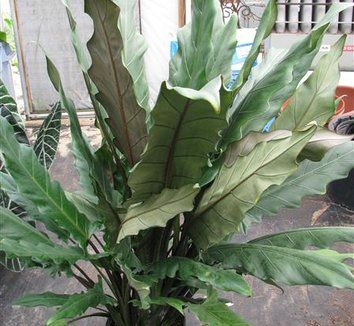Alocasia Lauterbachiana
Low humidity is closely linked to underwatering as this will cause the plant to transpire at an increased rate. The leaves are dark-green to purple in shade with brownish undersides scalloped edges and may get around 2 feet long.

Alocasia Lauterbachiana Very Rare Unique Etsy Kebun
It is also its leaves that the plant is known for.

Alocasia lauterbachiana. You can also cut down on a few leaves on the lower end of the stem to improve the growth rate of the plant. Alocasia leaves drooping due to low humidity will be accompanied by other symptoms of low humidity including leaf curling brown leaf tips and leaf edges. The record derives from WCSP data supplied on 2012-03-23 which reports it as an accepted name record 6762 with original publication details.
Alocasia lauterbachiana Care includes warm and most place bright. Alocasia Lauterbachiana is a radiant perennial and tropical plant that belongs to the family Araceae. Full description coming soon.
Alocasia lauterbachiana Synonyms of Alocasia lauterbachiana 3. Another Alocasia to add to the collection. This species was originally named Schizocasia lauterbachiana until the 1970s-80s when Australian botanist Alistair Hay reclassified it under Alocasia.
Purple Sword features dark purple sword shaped leaves and purple stemsLooks great mixed with. Its very commonly found decorating homes and gardens as it is suitable for both indoors and outdoors. Especially on Borneo he is very common and can grow up to four meters high.
The specific epithet Lauterbachiana honours German botanist Carl Adolf Georg Lauterbach a close. Aroids Papua New Guinea 31 1990. About Press Copyright Contact us Creators Advertise Developers Terms Privacy Policy Safety How YouTube works Test new features Press Copyright Contact us Creators.
It was described as such by Alistair Hay in Aroids of Papua New Guinea in 1990. The second most common name of Alocasia Lauterbachiana is the purple sword because of the purple-colored vein in the center underside of the leaves. Alocasia wavriniana Mast Schizocasia lauterbachiana Engl Xenophya lauterbachiana Engl Nicolson.
Add a decorative pot to complete the look. Around the equator the plant has been grown for 28000 years as food. General Alocasia Care Tips.
These plants are low-maintained and easy to propagate. The Alocasia baginda plant will look great. The Alocasia Lauterbachiana also popularly known as the Purple Sword is a type of Alocasia plant which is perennial and evergreen.
Click to share on Twitter Opens in new window Click to share on Facebook Opens in new window Click to print Opens in new window Click to share on Pinterest Opens in new window. The Alocasia Lauterbachiana with its beautiful wavy leaves the leaf stems and the underside of the. The purple sword or Alocasia Lauterbachiana hardly grows high indoors.
Instead it is because of the edges of its leaves. Browse pictures and read growth cultivation information about Alocasia Species Taro Root Elephants Ear Baroque Sword Alocasia lauterbachiana supplied by member gardeners in the PlantFiles d. I f you are looking for something a little different with a tropical vibe then this one is a must-have.
Shade to partial sun Water. We ship Alocasia lauterbachiana to US UK Europe Japan Philippine Singapore Malaysia NetherlandsKorea and most other counties. The Alocasia lauterbachiana plant grows tall pointy leaves.
Shipping calculated at checkout. But not because it has large foliage. Bright indirect light is preferred but they can also handle both lower amounts of.
Hay is the correct and accepted scientific name for this species. There are 79 species known. Alocasia lauterbachiana Its slender long wavy spear-like leaves make the Lauterbachiana different from any other Elephant Ear.
The plant is sold in a plastic grow pot. Alocasia lauterbachiana 2299. The Black Velvet produces heart-shaped leaves.
The alocasia lauterbachiana is also known as the purple sword because of the purple colors of its flowers and different parts of the plant. Underneath the leaves is a pretty dark purple. Alocasia Lauterbachiana care needs regular maintenance.
The plant is most commonly known as Elephant ears due to its leaves wavy edges. Lauterbachiana has natural distributions across Indonesias Papua New Guinea and nearby islands of New Britain and New Ireland. The Alocasia lauterbachiana is a classic perennial Aroid adapted to both indoor and outdoor environments.
Alocasia lauterbachiana Engl AHay is an accepted name This name is the accepted name of a species in the genus Alocasia family Araceae. Alocasia lauterbachiana Engl A. Alocasia belongs to the Arum family and grows in the tropical rain forests of Southeast Asia.
Like the Alocasia micholitziana this plant has green leaves with bright white veins. Cut down the unhealthy and dead leaves from the plant regularly to ensure a healthy thriving plant. Many people also refer to it as elephant ears.
The Alocasia Lauterbachiana has beautiful wavy leaves the leaf stems and the underside of the leaves are colored red.

Alocasia Lauterbachiana Tanaman Tanaman Pot Hidroponik

Alocasia Lauterbachiana Alocasia Elephant Ear Rare House Plant Plants House Plants Apartment Garden

Alocasia Lauterbachiana Plants Plant Life Indoor Gardens

Alocasia Lauterbachiana

Alocasia Lauterbachiana Rare Plants Indoor Plants Low Light Plants

Alocasia Lauterbachiana Indoor Plants Plants Daun

Buy Alocasia Lauterbachiana Elephant Ear Free Shipping Over 100

Az Alocasia Lauterbachiana Gondozasa Citygreen Hu Ide Berkebun Tanaman Hias Daun Kebun

Alocasia Lauterbachiana Plants Houseplants Indoor Plant Decor

Alocasia Lauterbachiana Plant Leaves Plants Bonsai

Pin On Garden

Pin On Alocasias

Alocasia Lauterbachiana Purple Sword Bunga Kebun Tanaman

Alocasia Attention Experience Facing Grow Keeping Lamp Lauterbachiana North Pic Position Purple Small Sunny Survive Sword Window Can Alocasia L

Alocasia Lauterbachiana Elephant Ears Plant Care Plants

Alocasia Black Velvet Alocasia Red Secret Alocasia Lauterbachiana Plants House Plants Indoor Trees To Plant

Alocasia Lauterbachiana Purple Sword M Alocasia Plant Plants Plant Care